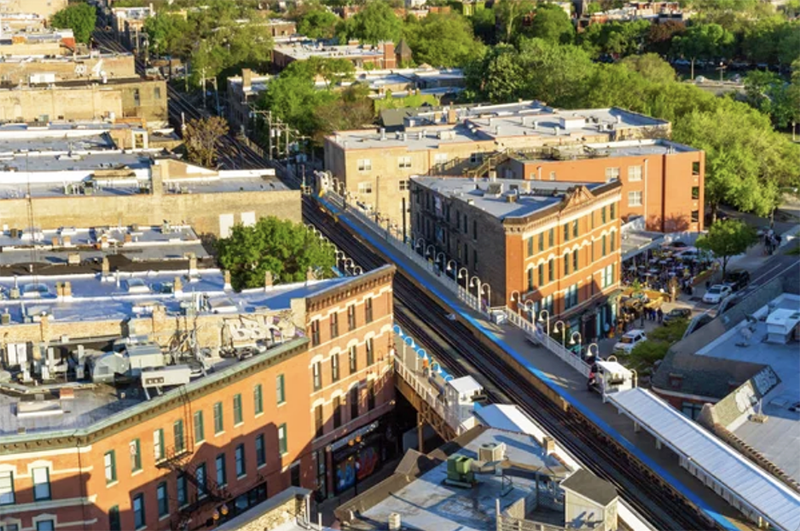Chicago, fondly known as the Windy City, is a bustling metropolis that attracts countless people every year with its breathtaking architectural wonders, top-tier culinary offerings, and rich and diverse culture. But how good is Chicago as a place to live? This city, with its endless opportunities for entertainment, career development, and a lively urban lifestyle, also has its fair share of challenges. In this comprehensive article, we will delve into the various advantages and disadvantages of living in Chicago to help you make an informed decision about whether it suits your lifestyle and needs. So, whether you’re looking for cozy studio apartments or sprawling homes for sale in Chicago, stay tuned to discover what life in this vibrant city entails.
Pros of Living in Chicago:
1. Thriving Arts and Culture Scene
Chicago is a cultural hub, boasting world-class institutions such as the Art Institute of Chicago and the beautiful Chicago Theatre. The city plays host to numerous art fairs and festivals, including the globally renowned Chicago Jazz Festival and Hyde Park Jazz Festival, which draw musicians from all corners of the world. Whether your interest lies in theater, music, dance, or visual arts, Chicago offers a rich and inspiring cultural experience for every enthusiast.
2. Enthralling Sports and Entertainment Options
Chicago is a city that never sleeps, offering a wide array of entertainment options. Sports aficionados can root for their favorite teams, including the Chicago Cubs, White Sox, Bulls, and Blackhawks. The city also boasts world-class theater companies, such as the Steppenwolf Theatre Company and the Goodman Theatre, presenting exceptional productions year-round. Music enthusiasts will appreciate the diverse offerings, from the elegant performances by the Chicago Symphony Orchestra to the gritty blues clubs on the South Side. Furthermore, Chicago’s nightlife is legendary, with vibrant neighborhoods like River North and Wicker Park teeming with bars, clubs, and lounges.
3. Diverse Cuisine and Dining Options
Renowned for its deep-dish pizza, Chicago is a paradise for food lovers. The city’s culinary scene is incredibly diverse, featuring gourmet farm-to-table restaurants and street food vendors serving an array of savory delights. Neighborhoods like Pilsen and Chinatown offer authentic Mexican and Asian fusion cuisines, respectively. The city’s famous Chicago-style hot dog is a must-try, available at numerous street-side stands. Regardless of your culinary preference, Chicago’s food scene is bound to leave you satisfied and craving more.
4. Scenic Lakefront and Outdoor Spaces
Chicago is blessed with an impressive lakefront and numerous green spaces, offering plenty of opportunities for outdoor activities. The city offers 18 miles of public beaches, including North Avenue Beach and Oak Street Beach, perfect for relaxation, swimming, or a leisurely stroll. Lakefront parks like Grant Park and Millennium Park offer stunning views of the city skyline and host various outdoor events and concerts, these are great photography locations for social media. Chicago also boasts over 580 parks and 26 miles of lakefront trails for biking, running, or a leisure stroll.
5. Excellent Public Transportation
Chicago’s comprehensive public transportation system makes it a desirable location for those who prefer a car-free urban lifestyle. The city offers the “L” train and bus system, bike-sharing options, and water taxis. The Chicago Transit Authority (CTA) provides reliable and affordable transportation throughout the city, including to O’Hare International Airport. Many of Chicago’s neighborhoods are also pedestrian-friendly, offering easy access to amenities and attractions.
Cons of Living in Chicago:
1. High Sales Taxes
Chicago stands among the cities with the highest sales tax rates in the United States. The total sales tax rate in Chicago sums up to 10.25%, which comprises a 6.25% state sales tax and an assortment of local sales taxes. This high tax rate implies that purchases made within the city carry a considerable tax burden. While these taxes contribute significantly to sustaining the local infrastructure and various city services, they could become a deterrent for those who are budget-conscious or prefer to maintain minimal expenses. As such, the high sales tax is a crucial factor to keep in mind when contemplating living in Chicago.
2. Intense Winter Season
Chicago is infamous for its exceptionally harsh winters. From December through February, temperatures can plummet below freezing, bringing along snow, ice, and forceful winds. The city frequently experiences blizzards, causing disruptions to transportation and making it challenging to navigate around. However, the frigid weather doesn’t entirely dampen the spirits of Chicagoans. They embrace the cold by indulging in winter activities such as ice skating, skiing, and snowboarding. The city also hosts an array of winter festivals and events, including the Christkindlmarket, a traditional German Christmas market, and the Polar Plunge, an event where brave participants dive into the icy waters of Lake Michigan to raise funds for charitable causes.
3. Congested Traffic Conditions
Chicago’s extensive grid of highways and major roads often find themselves swamped with commuters, leading to delays and frustration for drivers. Furthermore, the city’s high population density and limited parking availability add to the hassle of navigation and parking. To mitigate traffic congestion, the city has rolled out multiple transportation alternatives like buses, trains, and dedicated bike lanes. Nonetheless, it’s crucial to factor in the possibility of heavy traffic when planning commutes in and around the city.
4. Environmental Concerns and Air Pollution
Like many other major urban centers, Chicago grapples with environmental issues, including air pollution. The city is home to numerous industrial and transportation sources that contribute to the degradation of air quality. The Chicago metropolitan area has earned a notorious ranking among the worst in the country concerning pollution levels. Besides, the city faces challenges like lead contamination in its drinking water and an absence of green spaces in certain neighborhoods. Nevertheless, Chicago is proactive in addressing these problems through initiatives like the Chicago Climate Action Plan and the Green Healthy Neighborhoods program. These programs aim to curb emissions and enhance the accessibility of green spaces in underserved areas.
5. High Cost of Living
As a central metropolitan hub and one of the largest cities in the United States, Chicago is well-known for its high cost of living. Housing expenses are a major contributor, with average apartment rents ranging between $1,300 and $2,284. Furthermore, utilities, transportation, and groceries tend to be pricier in the city compared to other regions. Therefore, it’s vital to thoroughly explore different neighborhoods and suburbs to find housing options that align with individual budgets in Chicago.
Deciding Whether Chicago is a Suitable Place to Live: Final Thoughts
Residing in Chicago comes with a unique set of advantages and disadvantages, and the decision to make it home ultimately hinges on personal preferences and priorities. On one side, Chicago offers an array of attractions such as world-class cuisine, a vibrant arts and culture scene, convenient transportation options, exciting entertainment avenues, and beautiful outdoor spaces. Conversely, the city also presents challenges like a high cost of living, severe winters, heavy traffic congestion, air pollution, and elevated sales taxes. When pondering whether Chicago is the ideal place to live, it’s important to weigh these pros and cons and decide what aspects are most crucial to you in a city. If you decide that Chicago is indeed






